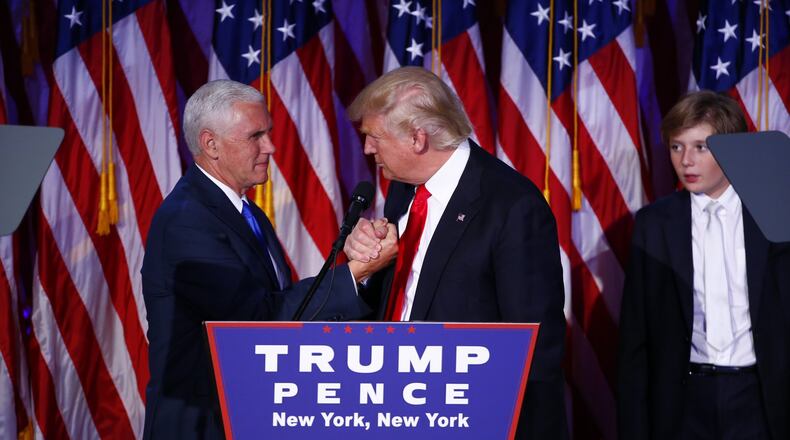“He’s got the keys to the legislative kingdom,” said James Manley, a former adviser to Senate Minority Leader Harry Reid, D-Nev. “They can move pretty much anything they want.”
Trump should have enough votes to revise or kill the 2010 health law known as Obamacare. But analysts say if he turns against House Speaker Paul Ryan, R-Wis., moves to build a massive wall on the Mexican border, or deport millions of undocumented immigrants, any goodwill he has generated will quickly dissipate.
Jessica Towhey, a consultant in Washington and onetime staffer to former House Speaker John Boehner, R-West Chester Twp., said Trump’s victory speech established “the right tone that people want to hear, not just in a victory speech, but in someone who is expected to lead the country forward.”
“This was a complete repudiation of the last eight years,” Towhey said of the election. “This is massive change that has been voted in. And that is scary enough for people. But the idea that the person voted in would use that for petty revenge would just demean everything that office needs to stand for.”
In his speech early Wednesday morning, Trump said it was time “for America to bind the wounds of division,” adding that “to all Republicans and Democrats and independents across this nation, I say it is time for us to come together as one united people.”
President Barack Obama and Hillary Clinton both offered similar sentiments as they addressed the nation on Wednesday.. Trump met with Obama Thursday to discuss the transition.
To date, Trump has provided few clues over whether he will govern as a staunch conservative who would push Congress to sharply cut taxes and regulations, or if he will seek common ground with both parties.
Harry Stein, director of fiscal policy at the Democratic-leaning Center for American Progress in Washington, said “there were a lot of reasons people supported Donald Trump that did not come back to economic white papers and because of that it’s harder to know what his policy agenda is going to be.”
Throughout the campaign Trump gave lip service to the conservative agenda on overhauling the tax code and slashing taxes. But John Feehery, a former U.S. House Republican staffer, said Trump is “not ideological. He is a deal cutter.”
“He’s going to cut deals on big things like infrastructure, regulation, taxes and immigration,” Feehery predicted. “He’s not going to get everything he wants. His policy pronouncements haven’t been that detailed, so it will give Republicans in the Congress the ability to fill in the details.”
Towhey said “the only way we’re going to get anything done” is to keep Republicans “unified. It doesn’t mean a unified Republican party that stomps all over the Democrats. This has to be a reform Congress. They have to look and say, ‘People are angry.’ ’’
Trump, who alarmed Republican foreign policy officials with campaign talk that mirrored the American isolationists of the 1930s, offered a kinder and gentler message Wednesday, saying, “ While we will always put America’s interests first, we will deal fairly with everyone — all people and all other nations. We will seek common ground, not hostility; partnership, not conflict.”
Peter Mansoor, General Raymond E. Mason Jr. Chair of Military History at Ohio State University and a former executive officer in Iraq to General David Petraeus, called Trump’s speech a “good start trying to heal the rifts caused by the campaign.”
But Mansoor, who endorsed Democratic presidential nominee Hillary Clinton, said if Trump “puts in place policies he campaigned on, it means a retrenchment of American power from the world.”
About the Author
